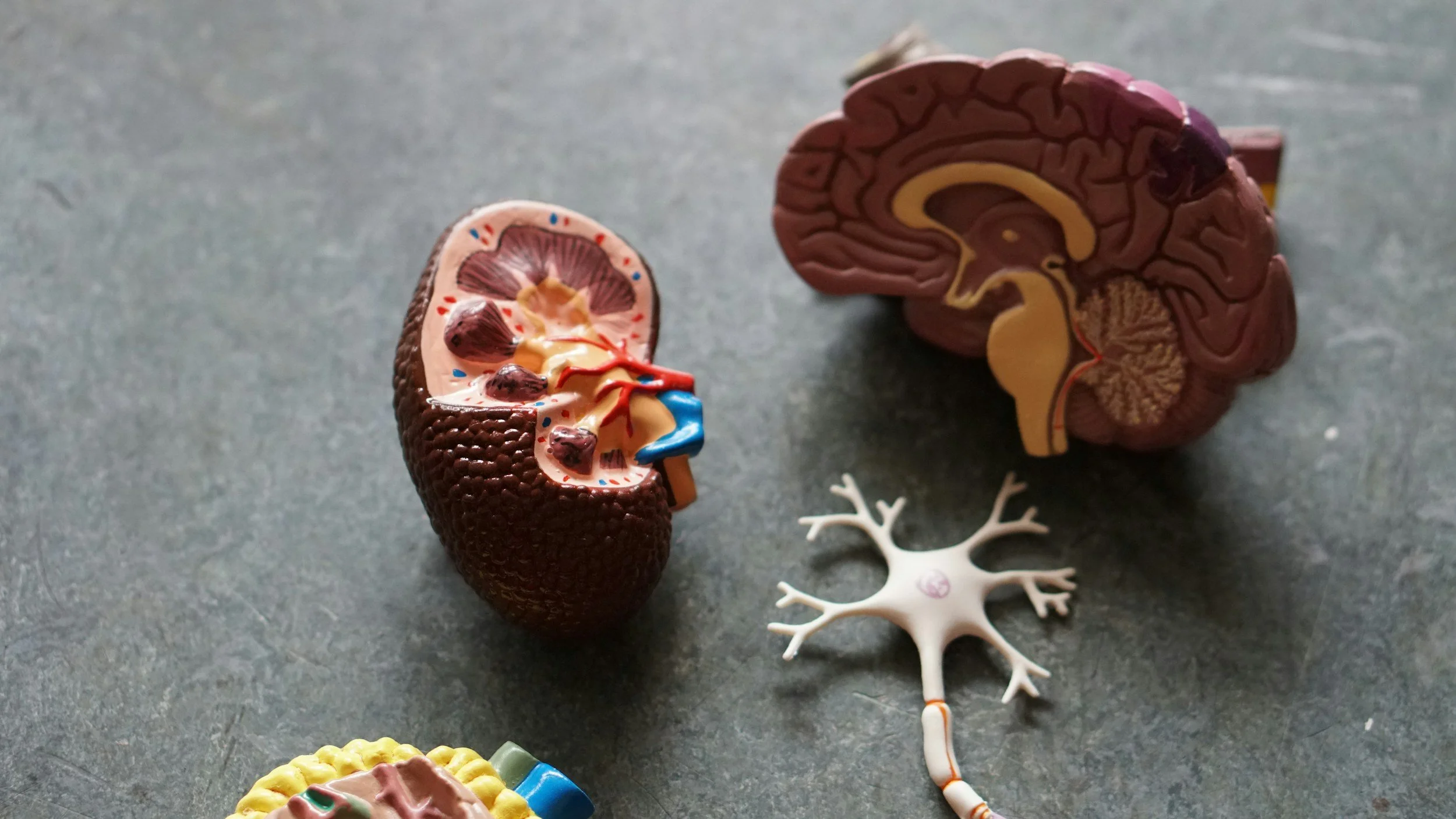Hormones and TCM: A Holistic Approach to Balancing the Endocrine System
Hormones regulate essential bodily functions, including metabolism, stress response, and mood. In Traditional Chinese Medicine (TCM), the endocrine system is closely linked to the balance of Qi, Yin, and Yang, primarily governed by the Kidney, Spleen, Liver, and Heart systems. When hormonal imbalances occur, they can manifest as fatigue, weight fluctuations, stress, and other systemic symptoms.
Adrenal Glands and TCM Perspective
The adrenal glands produce hormones like cortisol, adrenaline, and aldosterone, which regulate stress, blood pressure, and metabolism. In Western medicine, adrenal dysfunction is often linked to chronic stress, leading to adrenal fatigue with symptoms like exhaustion, anxiety, and difficulty sleeping.
From a TCM perspective, the adrenal glands correspond to the Kidney system (Shèn, 腎), which governs essence (Jing), growth, reproduction, and stress response. Adrenal fatigue is often classified as Kidney Qi Deficiency, Kidney Yang Deficiency, or Kidney Yin Deficiency, sometimes involving the Liver and Heart.
Common symptoms include lower back pain, dizziness, tinnitus, fatigue, and emotional instability. Treatment focuses on strengthening the Kidneys and balancing Yin and Yang.
Acupuncture: Points such as Shenshu (UB23), Guanyuan (CV4), and Taixi (KI3) help tonify Kidney Qi and Yang, restoring adrenal function.
Herbal Medicine: Liu Wei Di Huang Wan (Six-Flavor Rehmannia Pill) nourishes Kidney Yin, while Jin Gui Shen Qi Wan (Golden Cabinet Kidney Qi Pill) supports Kidney Yang.
Dietary Therapy: Warming foods such as lamb, walnuts, and black sesame seeds support Kidney Yang, while excessive caffeine and cold foods should be avoided.
Thyroid Gland and TCM Perspective
The thyroid gland controls metabolism through hormones such as triiodothyronine (T3) and thyroxine (T4). In Western medicine, thyroid dysfunction is categorized as hypothyroidism (low thyroid function) or hyperthyroidism (overactive thyroid), often linked to autoimmune conditions like Hashimoto’s thyroiditis or Graves’ disease.
In TCM, the thyroid is closely associated with the Kidney, Spleen, and Liver systems. Hypothyroidism often stems from Kidney Yang Deficiency or Spleen Qi Deficiency, resulting in fatigue, weight gain, and cold intolerance. Hyperthyroidism is linked to Liver Qi Stagnation or Yin Deficiency with Heat, presenting symptoms like irritability, heart palpitations, and weight loss.
Acupuncture: Points such as Fenglong (ST40), Taixi (KI3), and Tianrong (SI17) regulate thyroid function and metabolism.
Herbal Medicine: Zuo Gui Wan (Restore the Left Kidney Pill) nourishes Kidney Yin, while Jia Wei Xiao Yao San (Modified Free and Easy Wanderer) soothes Liver Qi stagnation.
Dietary Therapy: Iodine-rich foods like seaweed benefit the thyroid, while processed foods and excessive sugar should be minimized.
Pituitary Gland and TCM Perspective
The pituitary gland is known as the "master gland" in Western medicine because it regulates the adrenal, thyroid, and reproductive hormones. Dysfunction in this gland can lead to hormonal imbalances affecting growth, metabolism, and stress response.
In TCM, the pituitary gland corresponds to the Heart and Kidney systems. The Heart governs Shen (spirit), while the Kidney stores essence (Jing). Imbalances in the Chong Mai (Penetrating Vessel) and Ren Mai (Directing Vessel) affect the pituitary's ability to regulate hormones.
Common symptoms include fatigue, irregular menstruation, and poor growth regulation. Treatment in TCM focuses on harmonizing the Heart and Kidney and supporting the endocrine system.
Acupuncture: Points such as Baihui (GV20), Yintang (EX-HN3), and Guanyuan (CV4) help regulate hormonal function.
Herbal Medicine: Gui Pi Tang (Restore the Spleen Decoction) nourishes Qi and Blood, while Liu Wei Di Huang Wan (Six-Ingredient Pill with Rehmannia) strengthens Kidney function.
Dietary Therapy: Sweet potatoes, millet, and dates nourish the Spleen and help maintain hormonal balance.
TCM Approach to Hormonal Imbalances
Hormonal imbalances often stem from chronic stress, poor diet, toxin exposure, and emotional stagnation. TCM provides a holistic approach by restoring harmony in the body's Qi, Yin, and Yang balance.
1. Acupuncture and Herbal Medicine
Acupuncture stimulates the body's natural healing process, while customized herbal formulas strengthen the Kidney, Spleen, and Liver to support hormone production and regulation.
2. Detoxification and Liver Qi Regulation
Endocrine-disrupting chemicals (EDCs), such as Persistent Organic Pollutants (POPs), interfere with hormone production. TCM recommends detoxifying the body through herbs that move Liver Qi and support Spleen function. Huang Qin (Scutellariae Radix) and Dang Gui (Angelicae Sinensis Radix) help reduce inflammation and regulate hormonal balance.
3. Stress Reduction and Emotional Balance:
Stress and emotional stagnation significantly impact the endocrine system. TCM uses acupuncture, Qi Gong, and herbal therapy to calm the Shen (mind) and reduce Liver Qi stagnation. Acupuncture points like Yintang (Hall of Impression) and Taichong (Liver 3) help release stress and restore hormonal balance.
4. Gut Health and Hormone Regulation:
Digestive health is essential for hormone balance. TCM dietary therapy emphasizes warm, cooked foods that nourish the Spleen and Stomach, while minimizing cold, raw foods that create dampness. Probiotic-rich foods, such as fermented vegetables and herbal teas like ginger or licorice root, support gut health and improve hormone regulation.
Conclusion: A Balanced Approach to Hormonal Health
TCM views hormonal imbalances as disruptions in the body's energy flow and organ function. Instead of just treating symptoms, TCM addresses the root cause by balancing Qi, Yin, and Yang through acupuncture, herbal medicine, dietary therapy, and lifestyle modifications.
By strengthening the Kidney, Spleen, and Liver systems, improving stress resilience, and promoting detoxification, TCM can effectively support adrenal, thyroid, and pituitary health, leading to improved energy levels, metabolism, and overall well-being.

